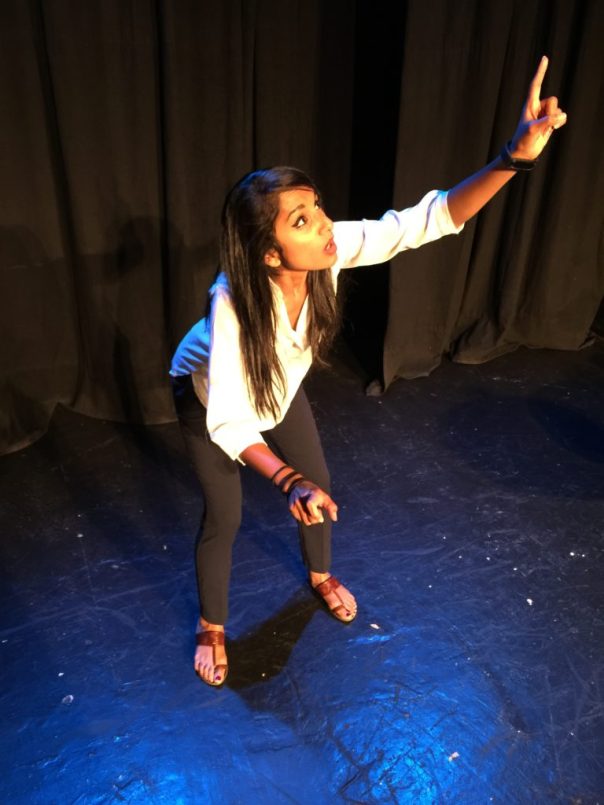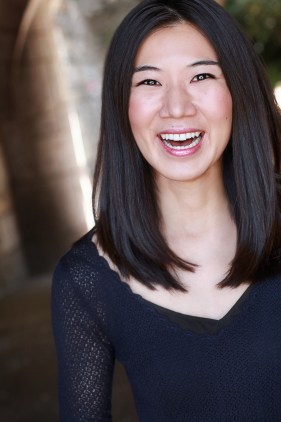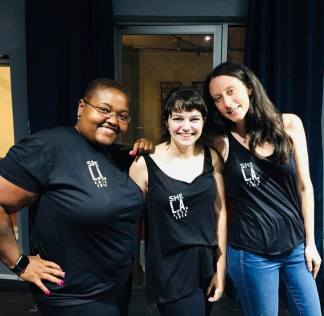Amongst dating, career, passions, failure and menstrual cycles, what woman can say her life is perfect all the time? It’s always more interesting and truthful to see women on film, stage and television having the same messy moments that we experience in real life. Shyam Bhatt took it upon herself to create a role for herself that’s this kind of woman in her first play, a solo show, “Treya’s Last Dance.”
“Treya’s Last Dance” premiered in Los Angeles at the 2015 Hollywood Fringe Festival, then traveled to New York and London. Now back in LA at the Hudson Guild Theatre, opening September 18, the play explores LGBTQ+ issues, feminism, and discrimination as Treya navigates through her dating life, her passion for dance and her family’s struggles. We were glad to get the chance to talk to Shyam about her – and Treya’s – journey before opening night.
LAFPI: I have to say, Shyam, that Treya’s Last Dance was a perfect blend of the humorous and tragic experiences that come with grief. How did this story come to you?
Shyam Bhatt: It’s totally fictional. Treya is a character who gets to be a little bit awful and awkward and prone to emotional outbursts in the worst, funniest and most heartbreaking ways. She gets to be a strong, full woman on stage. That was the sort of character I wanted to play and the character I wasn’t seeing written for people like me. And, in writing her, she just happened to have this event in her life that was pulling her through the play. That’s pretty much how it came about.
LAFPI: After reading the play, I’m most excited to see how the hilarity and the grief come together in your performance. Was it difficult to find a way to co-mingle the two in your writing process?
Shyam: I’ve always been one to try to see the humorous parts in life. These days, it’s so important to always maintain face in front of everyone, like you always have to have an amazing façade. And life will always get in the way of that. Life will always make sure that you have something spill on your white shirt before your interview or you’ll trip and rip your dress before you meet a date or something like that. I find that funny and great and part of the joy of being a human being: nothing is perfect.
So to co-mingle the grief and the humor wasn’t that difficult in the writing. What I’m finding now in the rehearsal process is that it’s much more difficult to move between those two as a performer fluidly, without creating a jarring effect. That’s an interesting thing that we’re finding now, my director and me.

LAFPI: What has it been like working with Poonam Basu as director?
Shyam: It’s been fantastic, really fantastic. I had worked with Tiffany Nichole Greene as director for the premiere of this play and it has changed quite a bit since then. Poonam is bringing a really new, fresh perspective to the whole thing. She is an actress/director and she’s got a fantastic insight into both how it feels to perform and how it looks to the audience. She’s pulling out threads that weren’t obvious to me and making them really heightened on stage. And she’s been really instrumental in the question you just asked, in how to bring together the grief and the humor.
LAFPI: Do you feel like she elevates your vision, to make it a great experience for you as a performer and make sense to the audience?
Shyam: Yeah, she’s got this bigger-picture perspective and she sees the play as a whole – making sure that we hit those beats, and refining it into a really nice theatrical production, in essence. It’s just very joyful to see the way that she shapes it. You’ll see, you’ll see when you come.
LAFPI: Has she changed your view of the piece?
Shyam: She’s emphasizing things I would not have chosen to emphasize and that is creating a different mood than I had anticipated, one very beautiful in slightly different ways. But very good ways! It’s a very lovely process to be involved with Poonam because the way that she works is very involved and extremely supportive.
LAFPI: One of the themes I felt was most prevalent in your play was societal pressure – not just affecting Treya’s love life, but also her brother’s sexuality. What made you decide to integrate the story of her brother’s passing with struggles in her dating life?
Shyam: Treya is a figurehead for all the stupid things that women go through. The ridiculousness of dating highlights the dark, horrible thing that Treya is going through at home; and the stark, terrible tragedy at home highlights the utter frivolity and silliness that happens in dating. And the fun of dating, actually. The two can’t be without each other; you can’t have sadness without happiness and vice versa.
LAFPI: It makes the funny moments hilarious and the tragic moments heartbreaking.
Shyam: And that’s one thing that Poonam is being extremely helpful with. As I said, it’s difficult to move between those two. And it’s really difficult, I think, as an audience member to give yourself permission to laugh at bits that come straight after something horrible. What she’s doing is managing those parts and the performance so the two punch each other up.
LAFPI: This play comments on the cultural differences between immigrants and the children of immigrants, as well as repressed sexuality due to Indian cultural pressures. What about Indian culture makes diverse sexuality so taboo, and what perspective shifts does this play suggest?
Shyam: Treya is Indian and British, but I think it’s a universal issue that crosses cultures. When people immigrate and have children in new countries, there’s a weird generational difference in understanding each other between the parents and the children – they’ve grown up, in essence, in different cultures, separated not only by time, but by space and culture and everything else.
Within traditional Indian culture, sexuality is not talked about and diverse sexualities are simply not thought to exist. I wanted to draw attention to the fact that not talking about them or allowing them to exist makes things extremely difficult for everyone involved.
I also wanted to highlight the fact that it’s not everyone who’s like this; it’s a community feeling. My own personal suspicion is that it comes from fear. Change is scary and change in a new country is really scary because you want to keep your inner circle close around you and have everything be the same as how it was. And that’s human nature, I think. But we’re moving into new – hopefully more accepting – diverse world. So these things can, should and will change. I hope.
LAFPI: I noticed specifically that Treya’s parents were supportive, and recognized that I’m not used to having diverse sexuality presented onstage with supportive parents. I really commend you on that
Shyam: Thank you. It’s so lovely to see shows where you have supportive parents because they exist, right? You always get the parents vilified and I thought, “I have a really nice set of parents.” I wouldn’t want to write a play where I even hint that we don’t have a nice relationship.

LAFPI: We see Treya’s grief process through a series of memories and adventures that remind her of her brother’s passing. How do you think that grief process fits into the new age of online communication and dating, which can be a little more alienating?
Shyam: That’s a really interesting question. I don’t know, but I will say that I feel very inspired by a play called The Nether by the American playwright Jennifer Haley. The play is set in the future and also in the Dark Net of the future. It questions what we become when the lines become blurrier between real life and simulated life.
I think in terms of grief and all human emotion, we are entering this superbly fascinating arena where we need to deal with these emotions by ourselves, and there’s also this open arena [online] where people can talk with each other and share those emotions. I find it interesting and a little but scary that, often, when you get people to talk about an emotion, the emotion may be heightened and become something else.
We’re already seeing that online [in discussion forums], you get people with a complaint and they build each other up until the complaint becomes huge. And yeah, a problem shared in a problem halved, and all of that, but also, maybe sometimes a problem shared is a problem squared.
LAFPI: I noticed when reading the script that there are many intentional pauses and breaks. For you, what makes these important to Treya’s character?
Shyam: That’s the other thing that was on my mind while I was writing: Both “Scrubs” and “Ally McBeal” have women who have these daydreams constantly, daydreams that just carry on while they’re living their lives. Everybody has daydreams, everyone just goes off in their own world when they’re trying to listen to something. And I wanted Treya to have that experience in some way.
As for the pauses, who has a completely wrinkle-free life? Everyone pauses, everyone is waiting, watching, wondering what’s going to happen next, not sure of the next step. We all have to take a breath sometimes. And that’s built in to show that Treya is a real, full-fledged human being who doesn’t always know – actually, pretty rarely knows – exactly what to say. And even then, often puts her foot in her mouth.
LAFPI: She seems a lot less polished than a lot of women are portrayed on screen or on stage.
Shyam: Yes, I wanted her to be the opposite of polished. She is supposed to be not perfect. Imperfect. And have quite a raw feeling to her.
LAFPI: So in an imperfect world, is is there anything you want the audience to know before they see Treya’s Last Dance?
Shyam: It’s been a really awesome journey writing this and performing this in a variety of places and they should come in with their minds open and enjoy themselves. Enjoy the play in the spirit with which it was written: one of joy.
“Treya’s Last Dance,” written and performed by Shyam Bhatt and directed by Poonam Basu, runs Wednesdays at 8 p.m., September 18 through October 23 at the Hudson Guild Theatre For information and tickets visit at www.onstage411.com or (323) 965-9996.





















 Nevertheless, She Persisted is an
Nevertheless, She Persisted is an 










